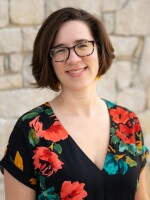A new combination of ancient song and contemporary dance draws beauty from the hidden history of women.
“Morena” is a Spanish word meaning “beautiful dark woman.” It is also the name of the latest project between Kansas City soprano and musicologist Victoria Botero, the Owen/Cox Dance Group, and a cadre of international musicians.
Botero compiled secular songs from Jewish, Muslim and Christian traditions, dating from the 9th to 20th centuries, most of them from strict societies in which women, Botero says, “had no agency.”
“These were communities where women’s voices were silent in their houses of worship and in the public sphere,” she says.
Within the musical sphere, though, “women are allowed to sing things they may not be able to talk about. They can sing about desire. They can sing about infidelity.”
Botero first presented the program, for voice and instruments, at the 1900 Building in 2016. Choreographer Jennifer Owen, co-founder of Owen/Cox, thought the material would lend itself to dance.

“There are a lot of stories within the songs, so there’s a natural narrative,” Owen says. Her dancers won’t be telling those stories literally, though. “Because it’s not spoken, dance can be more suggestive, more interpretive,” she says.
“My goal for each of the songs is to try and present a mood and a story.”
Originally, Botero was interested in the music of the Sephardic diaspora, which spread throughout the world after Jews were expelled from Spain in the 15th century.
She learned of an oral tradition passed from mother to daughter, when women would sing together as they prepared feasts for weddings and funerals, away from men.
Botero found an analogous tradition in an early Christian society, and wondered if there was a similar tradition in the Muslim world.
What she found, in fact, pre-dates the Sephardic songs. In a caliphate in Cordoba, the outmost reach of the Ottoman Empire in the 9th century, women developed a special repertory called Ring Songs, or Muwashshah.
“A singer would take a poem in Arabic, but she would pick out one phrase and come back to it, what we now call the refrain,” says Botero.
The women were slaves who would learn as many as 500 songs, which determined their price, Botero says. After Aquitanians re-conquered the territory, several hundred of these exalted Arabic female singers were taken north, where they learned a new language and likely forced to convert. But they kept singing, Botero explains.
“The troubadour and trouvère tradition comes directly from that influence,” she says.
Over a millennium later, those poems and songs have evolved into multiple versions, especially the popular "Lamma Bada Yatathanna," which celebrates a lover’s beauty:
For these songs, Botero performs with two members of the Chicago-based SHARQ Ensemble — Karim Nagi on percussion and Aboud Agha on oud — as well as Kansas City’s Trilla Ray-Carter on cello.
The Christian portion of the program draws from an Armenian a cappella tradition, passed mother to daughter, based on the repertoire of Zulal, an Armenian-American trio in New York. With their permission, she transcribed five songs for two voices, which she’ll perform with soprano Kristee Haney.
The song cycle follows a woman’s life, from young girl to bride to mother, with songs of love and rebellion, and includes songs from before and after the Armenian genocide of World War I. “Gago Mare, Garke Zis (Arrange My Marriage)” is a girl telling her parents who she does not wish to marry: not the teacher, who will forget about her; not the rich man, who will ignore her. She holds out for the shepherd, who will simply love her.
It ends with the lullaby, “Ari Im Sokhag (Come Hither, My Nightingale),” in which a mother asks birds to sing her child to sleep, and the child will only sleep to the song of the hawk — the bird of war.
“Many of these songs are about trauma, and generational trauma. How do you survive exile for 500 years? Or slavery? Or genocide?” Botero asks.
“You sing through it. And you teach your daughter the song.”
Though many of the songs are tinged with sadness, they present the full human experience, with joy, too, and even playfulness. “These themes, these stories and ideas, are timeless,” Owen says.
Botero laughs, “What could be more universal than 'I’m newly in love and, damn, he’s hot.'”
Owen/Cox Dance Group presents “Morena,” 8 p.m. on Saturday, October 20, and 2 p.m. Sunday, October 21 at Polsky Theatre Johnson County Community College 12345 College Boulevard, Overland Park, Kansas 66210.
KCUR contributor Libby Hanssen writes the culture blog Proust Eats A Sandwich. Follow her on Twitter, @libbyhanssen.



